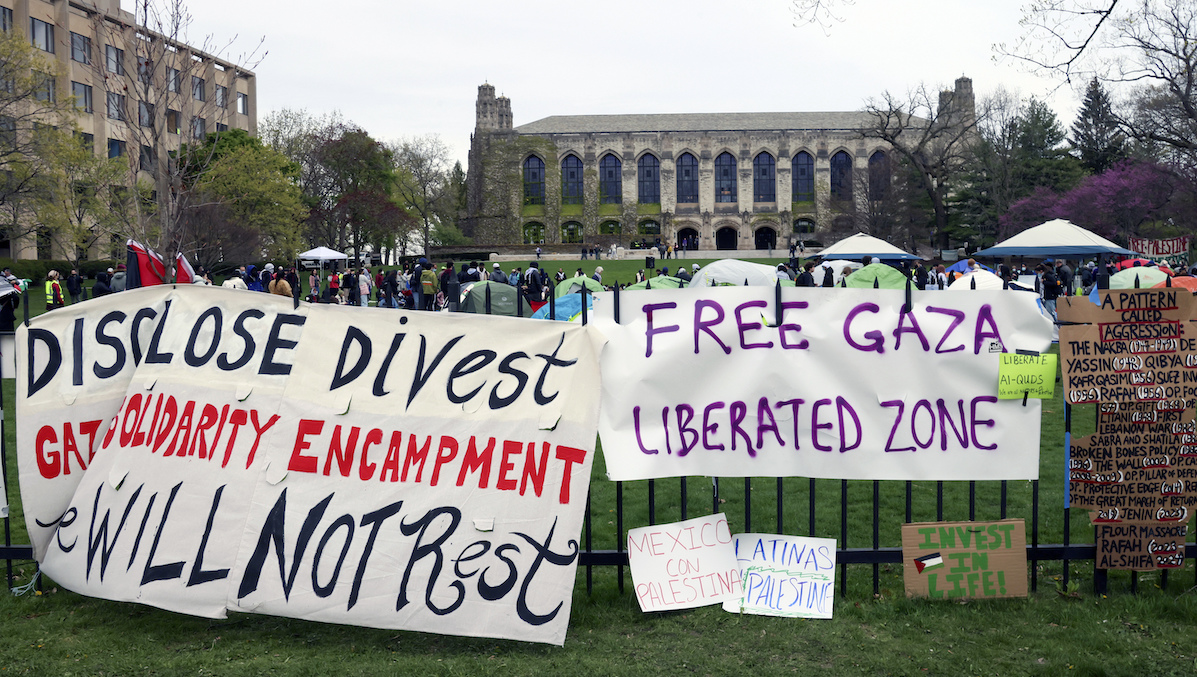Stand up for the facts!
Our only agenda is to publish the truth so you can be an informed participant in democracy.
We need your help.
I would like to contribute

Student protesters march around their encampment on the Columbia University campus April 29, 2024, in New York. (AP)
Student protests against the Israel-Hamas war have roiled college campuses across the U.S. for weeks, with many protesters demanding divestment from companies with ties to Israel or weapons manufacturers.
Those calls have so far been denied, although some universities have agreed to enter discussions with students.
But what is divestment, exactly?
At New York’s Columbia University, for example, protesters demand that the school redirect all of its money, including its endowment, away from companies and institutions that profit from what they call "Israel apartheid, genocide and occupation in Palestine." The companies they say profit from those things include Google, Amazon and Airbnb.
The Palestine Solidarity Committee at the University of Texas at Austin has demanded the school rescind the millions of dollars it invests in companies that manufacture weapons, which it said are "complicit in the genocide in Gaza." Similar demands were made at the university’s Dallas campus by Students for Justice in Palestine.
Sign up for PolitiFact texts
In the past, pressure from students and other protesters has persuaded schools to divest from some industries, such as fossil fuels. Experts we spoke with said there’s little evidence that divestment hurts targeted countries or businesses. They did say, though, that calls for divestment can be successful in raising public awareness about an issue, such as climate change or, in this case, the plight of Palestinian civilians in Gaza.
Jennifer Delaney, a University of California, Berkeley professor who studies higher education, said there's "scant evidence" that divestment limits the flow of resources to its intended target, but that divestment campaigns can effectively raise public consciousness about an issue.
"If the goal is to change the discourse around apartheid, climate change, and the current Israel-Hamas war, then this approach is effective," Delaney wrote in an email.
Protesters are asking universities to sell off endowment investments in companies tied to the Israel conflict.
Endowments are generally donation-supported investments that a school uses for long-term funding; they are often run by outside managers and invested in index, hedge or mutual funds. Endowment money is used to support teaching and research, and some endowments are worth tens of billions of dollars. Harvard University’s endowment, for example, is valued at $50.7 billion. Columbia’s stands at $13.64 billion.
A 2023 fiscal year survey by the National Association of College and University Business Officers showed that 688 participating colleges and universities had $839.1 billion in their endowments.
"Typically divestment campaigns focus on university endowments," because of their size and because many endowment funds are invested, Delaney said. "It is possible to see divestment in other areas, like purchasing, contracts, capital (building), etc., but these have been used less frequently in national campaigns."
Nicholas Dirks, a University of California, Berkeley, history professor and the school's former chancellor, said endowments include money invested in stocks and bonds. The endowment principal is not "spent down" by the university, only the interest, he said. Depending on returns, the university will generally spend about 5% of the endowment annually, Dirks said.
Columbia students have said they hope if their college divests from companies tied to Israel or weapons manufacturers, other institutions will follow suit.

Signs are displayed outside a tent encampment April 26, 2024, at Northwestern University, in Evanston, Illinois. Students want the university to divest from funds connected to Israel or that profit from its war in Gaza. (AP)
Columbia President Minouche Shafik said in an April 29 statement that the university "will not divest from Israel." The university has offered to have its Advisory Committee for Socially Responsible Investing, which considers divestment matters, review new proposals from students.
The University of California in an April 26 statement said it has "consistently opposed calls for boycotts against and divestment from Israel" because it considers them impingements on academic freedom.
Although no schools have publicly agreed to divestment, Northwestern University and Brown University leaders agreed to give students more input on investments.
Universities have been receptive to calls for divestment in the past. Columbia in recent years has agreed not to invest in publicly traded oil, gas and coal companies, and to divest from the tobacco industry and private prisons. Harvard, after years of pressure, in 2021 announced it would no longer invest in the fossil fuel industry; now, less than 2% of its "legacy investments" remain in that industry, the Harvard Crimson student newspaper reported in March.
Experts told PolitiFact that divesting from companies tied to Israel or defense companies is possible, but likely complicated.
For one thing, it can be difficult to define what it means for a company to have ties to Israel, said Oliver Hart, a Harvard University economics professor.
"It's not well defined. There are all sorts of links you could have to Israel, some direct, some indirect, some extremely small," Hart said.
He gave as an example calls in 2020 for Harvard to divest from Booking Holdings, the parent company of travel site Booking.com, because it listed among its available properties Jewish settlements in Palestinian territory.
"The vast majority of business that Booking.com does is outside Israel," Hart said.
Many university endowments are invested in index funds or hedge funds. Index funds are a form of passive investment in which the fund mimics a benchmark index, such as the S&P 500. The endowment manager doesn't choose the stocks or bonds in those funds. Hedge funds are actively managed funds that often make riskier investments in search of higher profits. Those investments are usually locked for a year before shares can be sold.
Todd Ely, a University of Colorado Denver associate public affairs professor, said the more complicated the investment, the more difficult it is to divest.
"If a college or university invests in an index fund that tracks the S&P 500, then it must sell the entire investment just to get rid of any exposure to one of the 500 companies in the index," he said.
Hedge fund and private equity investments can be even more difficult to untangle, he said.
"Such investments often include lock-up provisions that restrict exiting the investments for a specific period of time, are commingled with funds of other institutional investors, or even limit transparency into the detailed holdings," he said.
Luigi Zingales, a University of Chicago professor of entrepreneurship and finance, said the difficulty level depends on the strictness of students’ demands.
If students want schools to get out of all indexes that contain defense stock, "this can be very costly and complicated," Zingales said. Asking venture capital or private equity companies not to invest in Israeli or defense stock could exclude schools from the most lucrative investments.
Dirks said divestment involving a country — especially one with as many economic, political, cultural and military ties with the U.S. as Israel — "is very complex and highly difficult."
"Since many funds are held in index or hedge funds, it would mean combing through each discrete investment account, with its specific provisions about terms of investment and other externalities, and deciding whether to issue instructions to change the investment profile to each discrete manager and/or fund," Dirks said.
One endowment could potentially include hundreds or thousands of investments connected in some way to Israel, he said.
"Even if one found a clear and tidy set of definitions, it could take years to (divest) without significant harm to investment returns," Dirks said.
Student protesters and others seeking social change have for decades advocated for divestment from companies or countries they deem problematic.
Delaney said there have been two significant divestment movements since the 1980s: One focused on divesting from South Africa during apartheid, and the other asked universities to divest from fossil fuels to address climate change.
Those movements were able to achieve divestments, but if success "means that they had an effect on the ultimate goal, there are doubts," Zingales said.
Hart was skeptical that divestment from companies doing business with South Africa played a significant role in apartheid’s dismantling, saying the change was the result of many factors.
"I think the consensus is (that divestment activity) hasn't been very successful," Hart said.
Dirks said in South Africa, "The amount of divestment was relatively small, and did not exercise a major impact on the dismantling of apartheid," but the pressure that came from disapproval of apartheid from the U.S. and other countries "was intensified by decisions around divestment."
Before the current student protests, a nearly two-decade long movement known as BDS — which stands for boycott, divest, sanctions — has advocated for those actions related to Israel.
BDS activists have called for institutions to divest from Israel-related holdings, boycott Israeli-made products and for governments to impose sanctions on Israel to weaken international support. Many student groups have embraced the BDS goals, but U.S. and state legislators have opposed sanctions and boycotts against Israel.
Zingales and Hart, along with Italy-based University of Trento economics professor Eleonora Broccardo, co-authored a 2022 study titled "Exit versus Voice," which looks at the effectiveness of divestments and boycotts versus shareholder engagement with companies.
Hart told PolitiFact the study showed that having a voice in a company as a shareholder has more impact than divestment or boycott.
Shareholders, in principle, could move the needle by voting for a resolution that could persuade a company to change a policy, Hart said. Any cost of that change would be spread among shareholders.
By contrast, he said, divesting from a specific area could potentially harm an endowment’s bottom line, and thus the university. Shares that an endowment sells are likely to be snapped up by others whose only motive is financial gain. A boycott would be more effective than divestment, Hart said, because if some people stop buying a company’s products during a boycott, others aren’t going to increase the amount they buy.
Hart said there could be a symbolic value in divesting from a company, such as tobacco manufacturers.
"Some people think that's just the right thing to do. They know it's not going to change the behavior of the cigarette companies, but they feel they would sully themselves by having any connection with the tobacco companies," Hart said. "So I'm not denying that element, but as far as impact is concerned, the university will be hurt much more than the companies they are divesting from, or Israel."
Delaney said targeted or impact investing is another method of affecting change that is growing in popularity. Instead of investing in a general mutual fund, individuals can make investments tied to social causes.
"The growth in popularity of these investment tools indicates a belief that targeted investing can be effective," she said.
PolitiFact Researcher Caryn Baird contributed to this report.
Our Sources
Email interview, Jennifer Delaney, University of California, Berkeley professor, May 1, 2024
Email interview, Luigi Zingales, University of Chicago professor of entrepreneurship and finance, May 1, 2024
Phone interview, Oliver Hart, Harvard University economics professor, May 2, 2024
Email interview, Nicholas Dirks, University of California, Berkeley history professor and former chancellor, May 2, 2024
Email interview, Todd Ely, University of Colorado Denver associate public affairs professor, May 3, 2024
Journal of Political Economy, Exit versus Voice, December 2022
CNN, Columbia student protesters are demanding divestment. Here’s what the university has divested from in the past, April 29, 2024
Compact, Colleges Owe Students Investment Transparency, accessed May 2, 2024
Columbia University, Office of the President, Statement from Columbia University President Minouche Shafik, April 29, 2024
Columbia University, Fiscal Year 2023 Endowment Performance, accessed May 3, 2024
Columbia Finance, Relevant Investment Policies, accessed May 2, 2024
Columbia University Apartheid Divest, Demands, accessed May 1, 2024
University of California Office of the President, University of California statement on divestment, April 26, 2024
Brown University, Agreement between University, student leaders will end ‘divestment’ encampment at Brown, April 30, 2024
Harvard University, Climate Change: Update on Harvard Action, Sept. 9, 2021
Harvard Crimson, Harvard Endowment’s Fossil Fuel Investments Drop Below 2%, March 28, 2024
Houston Chronicle, College students are protesting to get their schools to divest from Israel. Here's what that means., April 30, 2024
Journal of Business, The Effect of Socially Activist Investment Policies on the Financial Markets: Evidence from the South African Boycott*, 1999
Northwestern University, Agreement on Deering Meadow, April 29, 2024
Northwestern University, Northwestern commits to the following, April 29, 2024
NPR, Top companies are on students' divest list. But does it really work?, April 30, 2024
NPR, Here are the divestment demands that student protestors are making, April 26, 2024
The Guardian, Student protesters are demanding universities divest from Israel. What does that mean?, April 25, 2024
The Conversation, What students protesting Israel’s Gaza siege want — and how their demands on divestment fit into the BDS movement, May 2, 2024
Peabody Journal of Education, Using Strategies Elites Understand: Divestment as an Approach to Social Change, Nov. 2, 2022
KERA News, After brief meeting with UT Dallas president, pro-Palestinian students continue divestment calls, April 29, 2024
Palestine Solidarity Committee, Instagram post, May 1, 2024
The Daily Northwestern, Administrators, student demonstrators reach agreement to end encampment on Deering Meadow, April 29, 2024
The Daily Northwestern, SJP, EJP and JVP resolution demands NU divest from companies with ties to Israel, protect student speech, April 22, 2024
Yale News, Pro-Palestine protesters erect new encampment on Cross Campus, April 28, 2024
Investopedia, Understanding Endowments: Types and Policies That Govern Them, April 7, 2024
PolitiFact, Some university endowments are taxed. There are limits on how endowment funds can be spent, Aug. 31, 2022
CNBC, Index funds are one of the easiest ways to invest — here’s how they work, April 21, 2023
Investopedia, Hedge Fund: Definition, Examples, Types, and Strategies, April 12, 2024
NBC News, Campus calls to divest from Israel hinge on a tough question: Where's the money exactly?, May 2, 2024
American Council on Education, Understanding College and University Endowments, 2021
Harvard University, Financial Report, fiscal year 2023, accessed May 3, 2024
National Association of College and University Business Officers, U.S. Higher Education Endowments Report 7.7% Return for FY23 While Spending More in Support of Their Missions, Feb. 15, 2024


























